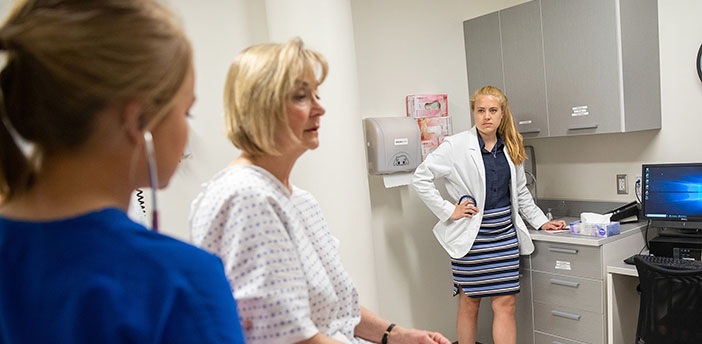From the classroom to the community, medical students learn to diagnose and treat substance use disorders.
Since 2013, the number of people in the US who die after opioid drug overdoses has increased precipitously—the Centers for Disease Control and Prevention puts the figure at approximately 130 fatal overdoses across the nation each day. And countless other individuals contend daily with the challenges of opioid use disorder.
In recognition of this growing health crisis, the Warren Alpert Medical School began in 2015 to revamp its curriculum in a way that fully integrates training on the use and misuse of opioids into all four years of its medical education program.
Throughout their training, Warren Alpert medical students learn how to treat substance-use disorders through the use of motivational interviewing—a counseling method intended to encourage behavior change—as well as hands-on practice in the community and participation in workshops with other health care students.
“Expanding our curriculum on opioid use disorder and other substance-use disorders came from a need we recognized in the Rhode Island community and the nation,” says Sarita Warrier, MD, assistant dean of medical education. “Unfortunately, we have seen a high rate of opioid overdoses. Training our medical providers to recognize and treat this crisis is critical.”
Last year, the Association of American Medical Colleges recognized the Medical School’s curriculum expansion with a 2018 AAMC Curricular Innovation Award. And this month, the two physician-educators who lead the program shared lessons they’ve learned in developing the innovative curriculum on addiction, opioids, and pain management with the country’s medical education community as part of a national workshop.
Michael Mello, MD, MPH, a professor of emergency medicine and of medical education who co-leads the program with Associate Dean of Medical Education Paul George ’01 MD’05 RES’08, MHPE, says that compared to three years ago, students emerge as new doctors significantly more prepared to address concerns about alcohol and drug use with patients.
“Students are developing their skills throughout all four years so that when I’m seeing them in the fourth year, they’re at a much higher level,” Mello says. “I hope that translates into them being able to provide better discussions with patients in the clinic and can help them along in their pathway to recovery more effectively.”
Continue reading here.




